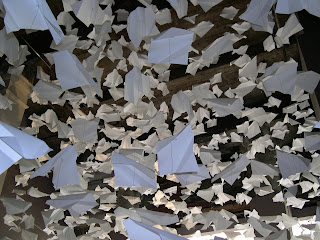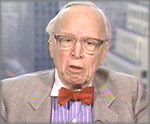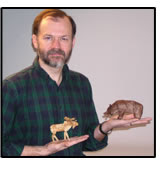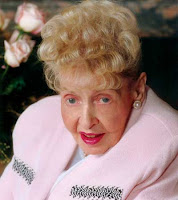Tuesday, March 13, 2007
Sunday, March 11, 2007
Saturday, March 10, 2007
Mom
 I've just returned from a visit with Mom in my hometown, Auburn, Alabama. She will turn 89 on May 4 and continues to live at 244 Woodfield Dr. in the house where I grew up. Born Vera Louise Harrison near Wilkes-Barre, PA, she had an older brother and sister. Her mother died when Mom was 13; Granddad, a school math teacher, told the children, "We'll be fine if none of you gets sick." And they never got sick. They lived in a duplex on Gates Street, a house built by my great grandfather, who was a contractor from Askum. They rented out half of the house to pay the mortgage. After Aunt Lois died a few years ago, Mom took us on a tour of her old haunts, including the house where she was born. The lady living there now allowed us to come inside for a look around.
I've just returned from a visit with Mom in my hometown, Auburn, Alabama. She will turn 89 on May 4 and continues to live at 244 Woodfield Dr. in the house where I grew up. Born Vera Louise Harrison near Wilkes-Barre, PA, she had an older brother and sister. Her mother died when Mom was 13; Granddad, a school math teacher, told the children, "We'll be fine if none of you gets sick." And they never got sick. They lived in a duplex on Gates Street, a house built by my great grandfather, who was a contractor from Askum. They rented out half of the house to pay the mortgage. After Aunt Lois died a few years ago, Mom took us on a tour of her old haunts, including the house where she was born. The lady living there now allowed us to come inside for a look around.Mom played the violin as a teenager. I had the bow restrung many years ago, but Mom never played it. She graduated from Mansfield State Teachers' College, where she was president of the women students. She studied home economics and became a high school home ec teacher in Dushore. She met Dad one summer when she went to take some grad courses at Iowa State. Dad was working on his Ph.D. in dairy science at the time. They met at a dance, and we still have Dad's diary in which he recorded the event. They were married in 1942, after Dad's graduation and before he took a job at University of Georgia. He wasn't there long before he joined the Navy. At that point Mom returned home to Wilkes-Barre, where I was born in 1945, 10 months before Dad got out of the Navy and came home to hold me for the first time.
After WWII ended, Dad took a job at Penn State for a brief period, maybe only a year. Then they moved to Auburn where they remained. Mom was the second woman to become an elder in the First Presbyerian Church. She taught Sunday School for years. She took a job in Pre-College counseling at the University for several years. Up until recently, she helped organize and sewed dresses for the annual church project to provide new school clothes for impoverished children in the county. She has played bridge at least twice a month for years. Each Christmas she makes coffee breads--something all her friends look forward to. One year she made over 40, but she's cut back to just a few each year. She was always able to tell a good story or joke. She has hardly ever been sick and has literally never been hospitalized for illness or surgery. She doesn't exercise, and she eats what she wants (th0ugh not much these days), yet remains in good health, taking only a small dose of blood pressure medicine daily. Her health and longevity are probably largetly due to her positive attitude, her refusal to worry about things she can't change. She's about the most laid back, unworried person I know. I hope some of that has rubbed off on me.
Tuesday, March 06, 2007
Ron Rash
 I've seen Ron Rash several times over the past month, first at the James Dickey Conference, then at the South Carolina Book Festival, and then yesterday at his reading at Columbia's Richland County Library. I have been reading and admiring Ron's poems and stories for years, since well before his novel One Foot in Eden drew national attention, well deserved. His subsequent novels, Saints at the River and A World Made Straight have both done well. All three have been read by Dick Estell on Radio Reader, the nationally syndicated NPR show. We adopted One Foot in Eden as a text for composition classes a couple years ago at Francis Marion University, inviting Ron to campus in connection with that. The book was a tremendous hit among the students.
I've seen Ron Rash several times over the past month, first at the James Dickey Conference, then at the South Carolina Book Festival, and then yesterday at his reading at Columbia's Richland County Library. I have been reading and admiring Ron's poems and stories for years, since well before his novel One Foot in Eden drew national attention, well deserved. His subsequent novels, Saints at the River and A World Made Straight have both done well. All three have been read by Dick Estell on Radio Reader, the nationally syndicated NPR show. We adopted One Foot in Eden as a text for composition classes a couple years ago at Francis Marion University, inviting Ron to campus in connection with that. The book was a tremendous hit among the students.Although I was already familiar with his work, I first met Ron maybe 6 years ago when we both taught for 3 weeks in the South Governor's School for the Arts Summer Program. He taught fiction, while I handled the poetry for the creative writing students. One of the most gifted of those students, Sarah Saylor, enrolled at USC, and I've run into her several times at readings on campus.
At Ron's library reading yesterday, which I attended with Janne, he was his usual relaxed and articulate self, his distinct Appalachian drawl spinning out stories both funny and poignant as he set up readings from two published novels and one forthcoming novel, the be called Serena. The longest piece he read was from the new novel, and it was about a strong woman, Serena, married to a timber baron, who is as adept at timber work as any of the men in their employ. Ron read a section about how she brought an eagle into the mountains and trained it to attack the rattlesnakes that were such a scourge in the woods. In the Q and A following, speaking of research, Ron told how he tracked down one of the few men who still hunts with eagles, corresponding with him and then I suppose visiting him to find out more about this arcane art. He said when you're doing research on a topic, the best thing to do is to find the person who's fanatical about it, who thinks it's the most important thing in the world, and you get your material from that source.
After responding to the inevitable question about his influences, he noted that he keeps a photo of Flannery O'Connor above his writing desk and imagines that every day she tells him, "You ain't there yet, boy." I can't wait to read Ron's new book of stories, Chemistry and Other Stories, due out next month--and then the novel, which won't be out for another year or so.
Monday, March 05, 2007
Tracy K. Smith

###
Arthur M. Schlesinger, Jr. as the last great public historian
###
William Safire on the word, "sucker"
###
Review of "The Unknown Monet"--early drawings at the Royal Academy
###
Poet Frank Bidart wins the 2007 Bollingen Prize
Sunday, March 04, 2007
Origami
 Paper Art in a San Francisco Gallery, April 2005
Paper Art in a San Francisco Gallery, April 2005Origami
scissors cut paper
paper covers rock
rock breaks scissors
origami crane
many folds away
from flatness
flies above the game
in Japan children bring
their hands together
scissors paper stone
V-fingered flat balled
choki paa guu
so fast you want
to see it again
now different one loses
one wins in contrast
the slow folding
of paper to bring
dimension as poets fold
one word on another
at right angles and wrong
scissors paper rock
mother’s jagged sewing
scissors called pinking shears
the paper I cut dulled them
forming little sawteeth
she rocked me
to dull me to sleep
origami makes paper lyrics
a thousand cranes bring
luck and folded words
choki paa guu
the poet knows paper
cuts rock crumbles
and scissors fly
Saturday, March 03, 2007
Schlesinger, Monro, Starkey
 The New York Times obituary of Arthur Schlesinger, Jr. reports that he died of a sudden heart attack in a New York restaurant at age 89. He was most famously an advisor to President Kennedy, writing a Pulitzer Prize-winning account of his "Thousand Days" in office. In 1945, at age 27, he also won a Pulitzer--that one for The Age of Jackson. Schlesinger grew up in Iowa City, where his father was a professor before moving to Harvard. He never got an advanced degree but was a prolific writer, continuing to produce until very recently. He wrote a book adamantly condemning the Iraq war, calling it a "ghastly mistake."
The New York Times obituary of Arthur Schlesinger, Jr. reports that he died of a sudden heart attack in a New York restaurant at age 89. He was most famously an advisor to President Kennedy, writing a Pulitzer Prize-winning account of his "Thousand Days" in office. In 1945, at age 27, he also won a Pulitzer--that one for The Age of Jackson. Schlesinger grew up in Iowa City, where his father was a professor before moving to Harvard. He never got an advanced degree but was a prolific writer, continuing to produce until very recently. He wrote a book adamantly condemning the Iraq war, calling it a "ghastly mistake." Thinking about Schlesinger reminds me of my Tougaloo College colleague John Monro, who died 5 years ago and was also 89 at his death. John knew Schlesinger at Harvard and often told stories about him and other Harvard luminaries such as Daniel Patrick Moynihan and Nathan Pusey. John's obituary in the Harvard Gazette recounts his decision to leave Harvard and work in historically black colleges in the south.
Thinking about Schlesinger reminds me of my Tougaloo College colleague John Monro, who died 5 years ago and was also 89 at his death. John knew Schlesinger at Harvard and often told stories about him and other Harvard luminaries such as Daniel Patrick Moynihan and Nathan Pusey. John's obituary in the Harvard Gazette recounts his decision to leave Harvard and work in historically black colleges in the south. Speaking of former colleagues (this one alive and well and nowhere near age 89), I just came across David Starkey's blog for The Creative Community TV Show, which he hosts in Santa Barbara. Starkey also edits King Log, an online poetry journal in which several of my poems appeared back in 1998. In a couple weeks, I'll see David in New York at the Conference on College Composition and Communication. David is writing plays these days, including his most recent, How Red the Fire, in which Emily Dickinson is a main character. For old time's sake, here are three poems by David, complete with audio.
Speaking of former colleagues (this one alive and well and nowhere near age 89), I just came across David Starkey's blog for The Creative Community TV Show, which he hosts in Santa Barbara. Starkey also edits King Log, an online poetry journal in which several of my poems appeared back in 1998. In a couple weeks, I'll see David in New York at the Conference on College Composition and Communication. David is writing plays these days, including his most recent, How Red the Fire, in which Emily Dickinson is a main character. For old time's sake, here are three poems by David, complete with audio.Friday, March 02, 2007
Origami and Poetry
 Two articles from The New Yorker's Anniversary Issue (February 19 and 26, 2007) interested me. Susan Orlean, one of my favorite nonfiction writers, contributed "The Origami Lab," a profile of Robert Lang, an accomplished physicist who now devotes his energies to origami. He applies mathematical modeling to new origami designs. He and various other practitioners have revolutionized the art (and science) of paper folding in the past 20 years. Some of the paper insects shown on his web site would seem to be a challenge to construct by any means, much less using the process of folding a small (6- or 7-inch) square of paper without making any cuts. I discovered amazing origami web sites by other artists (such as Joseph Wu).
Two articles from The New Yorker's Anniversary Issue (February 19 and 26, 2007) interested me. Susan Orlean, one of my favorite nonfiction writers, contributed "The Origami Lab," a profile of Robert Lang, an accomplished physicist who now devotes his energies to origami. He applies mathematical modeling to new origami designs. He and various other practitioners have revolutionized the art (and science) of paper folding in the past 20 years. Some of the paper insects shown on his web site would seem to be a challenge to construct by any means, much less using the process of folding a small (6- or 7-inch) square of paper without making any cuts. I discovered amazing origami web sites by other artists (such as Joseph Wu).
 In the same issue, Dana Goodyear's "The Moneyed Muse" tells what has happened at The Poetry Foundation in Chicago since Indianapolis heiress Ruth Lilly (at left) donated $200 million to it (and the magazine it publishes) in 2002. John Barr, the Wall Street executive and poet who was hired as president of the foundation, is overseeing plans to buy land and build a 25,000 square foot building to house the foundation, the magazine, a lecture hall, and a library. He wants it to be a "national home for poetry." Goodyear writes, "Money is a shocking thing in poetry, and Ruth Lilly's gift was greeted with a measure of ambivalence." That's putting it mildly. While some poets and critics cheered, others sneered and have continued sneering in the wake of some of the foundation's initiatives. I'd like to see at least some of the money dissiminated more widely among various excellent and established but financially struggling magazines. Perhaps the foundation will find a way to do that in the future.
In the same issue, Dana Goodyear's "The Moneyed Muse" tells what has happened at The Poetry Foundation in Chicago since Indianapolis heiress Ruth Lilly (at left) donated $200 million to it (and the magazine it publishes) in 2002. John Barr, the Wall Street executive and poet who was hired as president of the foundation, is overseeing plans to buy land and build a 25,000 square foot building to house the foundation, the magazine, a lecture hall, and a library. He wants it to be a "national home for poetry." Goodyear writes, "Money is a shocking thing in poetry, and Ruth Lilly's gift was greeted with a measure of ambivalence." That's putting it mildly. While some poets and critics cheered, others sneered and have continued sneering in the wake of some of the foundation's initiatives. I'd like to see at least some of the money dissiminated more widely among various excellent and established but financially struggling magazines. Perhaps the foundation will find a way to do that in the future.
Meanwhile, I'm pondering this juxtaposition of origami and poetry business (po-biz) in The New Yorker. Both arts involve giving a sort of dimension, literal or figurative, to a simple piece of paper. Both require only the simple work of hands to bring about a complex result. Robert Lang's origami pieces convert a 7-inch square of paper to shapes of almost unbelievable complexity. The Lilly bequest endows the ancient process of writing poetry with enormous consequentiality. Few, if any, poets will be enriched by the money. But if the foundation uses the money wisely, poetry itself could be enriched.
###
Poetry Foundation's response to Goodyear's New Yorker article, along with a series of related links
John McCain on Campus
 State Senator Hugh Leatherman and U.S. Senator John McCain
State Senator Hugh Leatherman and U.S. Senator John McCain















